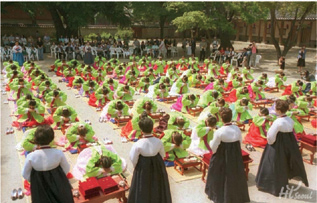
On the Coming-of-Age Day in the past, young men participated in the traditional gwan-rye by tying a topknot and wearing a traditional cylindrical Korean hat woven from horsehair filaments and young women braided their hair and held it up with an ornament to mark their transition from adolescents to adults. These young men and women, aged fifteen to twenty had reached a turning point. They were no longer perceived as children by the society after this ritual. However, today the tradition has changed to exchanging roses, perfume or a kiss, and the line between child and adult has no longer become prominent. Experts wonder if this is best way to mark such an important turning point in life.
“The social atmosphere has changed from the past. In contrast to the privileges that people received after they became official adults in the past, there is no distinctive difference for adolescents who have become adults in the contemporary era.” says Professor Kim Young-hoon (Korean Studies), lectures on the coming-of-age ceremonies during his class, Understanding Korean World Heritage.
Professor Hahm In-hee (Sociology) agrees with the fact that the significant change young adults experienced in the past are no longer prevalent. Hahm also criticizes the consumerism of current coming-of-age celebrations. “The rites of passage were once rooted firmly as an essential part of our lives. However, these rites have degraded to no more than another ‘day’ like Valentine’s Day or White Day, reflecting the desire of modern people to step away from their daily stresses,” says Hahm. “These events overcome with consumerism and events are replacing the significance that the rites had in the past.”
For young adults to spend a meaningful Coming-of-Age Day and ruminate on the true significance of becoming an adult, Kim suggests arranging time to spend on their own to think about their past and future. “Parents should give a ticket to their children rather than conventional gifts given such as roses or perfume. The ticket would be for a trip to the mountains or somewhere they can get away from their busy life and think about their identity.” Kim said that it is important to look back on the years spent as an adolescent and take time to seriously think over the responsibilities that one will have to bear as a mature adult after this day. “Rather than being recognized as an official adult through laws that stipulate a certain age that makes you an adult, the mature mindset is what makes a person a real adult. I hope students will take the opportunity to get prepared to become real adults on the Coming-of-Age Day this May,” adds Professor Kim.
The National Youth Commission, which is in charge of the Coming-of-Age Day in cooperation with Sung Kyun Kwan, an organization that is organizing a Coming-of-Age Day ceremony, also have arranged for adolescents to spend their upcoming Coming-of-Age Day in a meaningful way. Sung Kyun Kwan is holding the 35th anniversary of the Coming of Age Day Ceremony and the Representation of Traditional Gwan-Rye with one hundred young adults who have applied to participate. The ceremony introduces the traditional culture of Coming-of-Age Day and hopes to make the ritual a national ceremony for future coming-of-age days.
Yeu Moon-pil who is in charge of organizing this festival hopes that experiencing traditional gwan-rye as our ancestors did in the past will serve as a turning point in the way young people think about becoming an adult in Korean society now.

